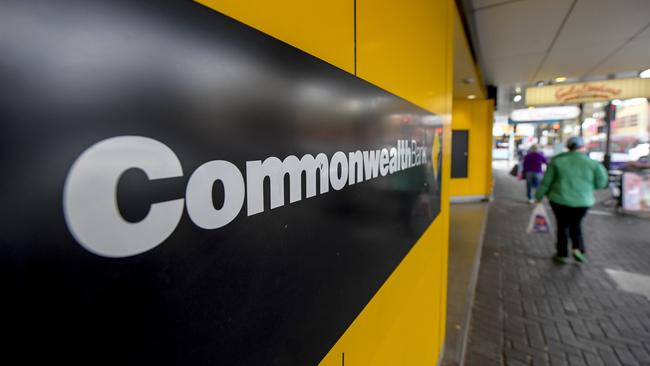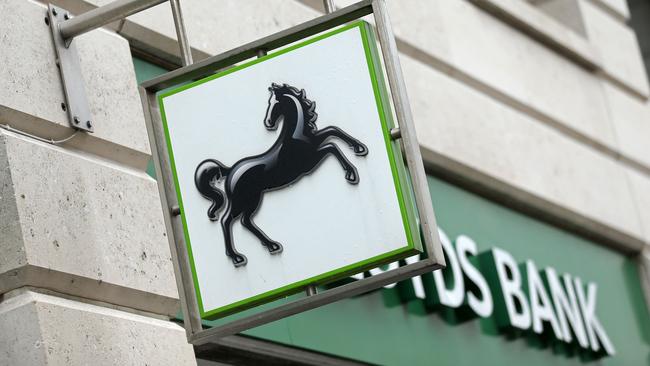Australian bank shares aren’t ‘overly expensive’ on some measures according to UBS
There are some ways to justify sky-high valuations on Australian bank shares but that doesn’t mean they’re a buy.

Business
Don't miss out on the headlines from Business. Followed categories will be added to My News.
Everyone agrees Aussie bank shares are expensive after strong gains in recent years.
There are some ways to justify their sky-high valuations, but that doesn’t mean they’re a buy.
The four majors have soared about 120 per cent on average from pandemic-era lows, boosting their 12-month forward PE multiple average to 16 times versus historic fair value of about 12 times. Prospective dividend yields have been compressed to little better than term deposit rates around 5 per cent, although bank dividends have the added benefit of franking credits for domestic investors.
At $US143bn in market capitalisation, CBA is the 13th biggest bank in the world. CBA is an astounding 16 times bigger than Citigroup and only 5 per cent smaller than Goldman Sachs.
No doubt many investors who bought decades ago are reluctant to increase their capital gains tax burden while everything seems to be going OK for banks in terms of net interest margins and loan loss provisions. Of course, another interest rate hike from the Reserve Bank could change that calculus as the possibility of higher net interest margins might be outweighed by loan loss provisions.
“Australian banks are seen as very expensive, but clients see few catalysts on the horizon that could fundamentally de-rate these stocks from here, outside of valuation,” said UBS analyst John Storey.
After one-on-one meetings with 60 domestic and international clients last month, Mr Storey said the strong outperformance of Australian bank share prices relative to the broader market had clients asking why that’s been the case and what they should be doing in regard to their portfolios.
As of June 30, the S&P/ASX 200 banks index was up 15 per cent for the calendar year versus 2.3 per cent for the S&P/ASX 200.
In financial 2023-24, the ASX banks sector rose 28 per cent versus 8 per cent for the ASX 200.
A question frequently asked by UBS clients is whether Australian banks are “becoming utility-like as their operating and business models become more commoditised”. Mr Storey says increased mortgage broker penetration – now at 73 per cent for the entire industry – is indeed starting to commoditise bank offerings, with liability spreads, cost management and servicing speed fast becoming “the new competitive advantage”.
“How banks adjust business models to either defend or pivot existing retail operating models is a key investment thematic,” he said.
As mortgage broker penetration and churn rates increase, he estimates that the average duration of a mortgage product has reduced from 6½ years in calendar 2019 to 4.2 years in 2023.
The impact of this on mortgage profitability based on his estimates is a drop in bank’s internal rates of return of over 10 percentage points, with a bigger impact in the earlier years of a mortgage.
Macquarie’s success and rapid market share gains in this sizeable product category has disrupted the status quo. ANZ, and to a lesser extent Westpac, are also growing well above the banking system, but in both instances, based on the UBS mortgage model, banks are embedding lower levels of profitability into their back book.

Mr Storey says the most interesting theme now is CBA stepping back from third-party distribution and leaning more heavily on its proprietary channels and building out its digital capabilities.
“Similar to Lloyds in the UK, CBA has the most to lose with 26 per cent market share and retail contributing about 45 per cent,” he said. “Lloyds had a profitably priced back book to defend, and it was willing to cede market share to maintain profits.”
Clients are also asking if the consensus could be “wrong” on the earnings outlook for banks. Interim results were slightly better than expected, but in no way justified their share price gains.
Underweight positions on the part of domestic institutions, a benign credit cycle and banks’ strong capital management via share buybacks and dividends, helped their share prices.
But the results showed sustained competitive pressures in mortgages and cost inflation in the sector. Overall earnings fell 2 per cent, with net interest margins down five basis points, revenue up 1 per cent, loan growth up 2 per cent and return on equity down 30 basis points to 11.2 per cent.
“In our view, the quality of the interim results … was poor,” Mr Storey said.
“In our view, however, valuations continue to run ahead of fundamental earnings, with UBS expecting cash earnings to fall 5 per cent for FY24.
“Nonetheless, higher swap rates continue to benefit replicating portfolios, driving NIM upgrades.”
UBS is “sell” rated on all the Aussie banks except ANZ and Macquarie, both rated “neutral”.
Mr Storey notes that their profits are more than ever a function of economic activity, as 80 per cent of their revenue comes from net interest income. Bank profits peaked at about 2 per cent of nominal GDP in 2015. At 1.3 per cent currently, it’s the second lowest level in 23 years.
But the market capitalisation of Aussie banks relative to GDP is near its long-term average, at 21 per cent. That’s below a peak of 25 per cent in 2013 but above a trough of 15 per cent in 2020.
“Compared to countries like Sweden, Spain and Canada, the Aussie banks don’t appear overly expensive, albeit earnings have held up better in these markets,” Mr Storey said.
More Coverage
Originally published as Australian bank shares aren’t ‘overly expensive’ on some measures according to UBS





